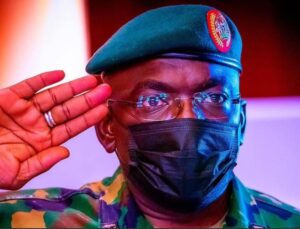Nigeria’s Chief of Army Staff, Lt. Gen. Ibrahim Attahiru died in an air crash in Kaduna on Friday.

Attahiru, a Hausa, was born on August 10, 1966. Intriguingly, he hailed from Doka in Kaduna, the State he passed away.
Attahiru was among the Service Chiefs appointed by President Muhammadu Buhari in January 2021.
The rest are General Leo Irabor – Chief of Defence Staff; Vice Admiral A. Z. Gambo – Chief of Naval Staff, and Air Marshal I. O. Amao – Chief of Air Staff.
In four months, the Nigerian Army under Attahiru recorded considerable success. Though troops were lost, several terrorists were eliminated.
The military launched a series of assault in the Sambisa general area and sects’ hideouts. Attahiru regularly visited Borno, the epicenter of the insurgency in Nigeria.
Under him, Operation Tura Takai Bango, the military’s first major operation this year to degrade threats in the North-East emerged. It was victorious.
The Multinational Joint Task Force (MNJTF) is assisting the offensive. Boko Haram commanders, Abul-Bas, Ibn Habib, Ali Bor and Maleum Modu, among others fell to firepower.
In February, Attahiru announced plan to launch the second phase of year 2021 counter-insurgency operation.
On various occasions, he hailed the synergy between the air and ground forces, and credited successes to the partnership.
The top military officer died three weeks after renaming the Operation in the North-East from Operation Lafiya Dole (OPLD) to Operation Hadin Kai (OPHK).
Army spokesman, Brig. Gen. Mohammed Yerima explained that the decision was taken based on the need to re-align for better efficiency.
“The renaming is in line with the COAS vision of having an Army repositioned to professionally defeat all adversaries”, Yerima noted.
He quoted Attahiru as saying the complete defeat of insurgency is a process that requires the stakeholders’ participation, using all elements of national power.
Before their appointments, Irabor and Attahiru were Commander and Deputy Commander at the Training and Doctrine Command (TRADOC) of the Nigerian Army, in Minna, Niger State.
Established in 1981, TRADOC is a research-oriented formation. The Command is charged with doctrinal training and combat development.
It supervises and coordinates research and development of all training schools, depots and the command college of the Nigerian Army.
TRADOC serves as a major senior think-tank and a liaison centre between the Army and educational establishments to ensure professional development of officers.
It also serves as headquarters for directing the operational tasks of various divisions of the Army that are on deployment.
Annually, TRADOC conducts and supervises the Senior Staff Course Qualifying Examination (SSCQE) for officers in the ranks of Major and Captain across all units.
Attahiru served as Theatre Commanders of Operation Lafiya Dole, the central outfit of the Army in North-Eastern Nigeria.
Irabor handed over the leadership of the unit to Attahiru on May 30, 2017.
Attahiru obtained a Graduate Diploma from the University of Nairobi, Kenya and holds Master’s degrees from the Nigerian Defence Academy and Salford University in the United Kingdom.
He attended the National Defence College, Kenya; the Chinese Peoples Liberation Army Special Forces Academy, Shijiazhuang, Hebei Province,; Bournemouth University, United Kingdom; and the Geneva Centre for Security Policy.
Attahiru served as the Deputy Director Office of Military Secretary; Director, Army Public Relations; Commanding Officer, 146 Battalion in the Bakassi Peninsula; Commander, 13 Brigade (Pulo Shield) in the South-South; and the General Officer Commanding 82nd Division, Enugu.
He was the Deputy Chief of Policy and Plans at the Army Headquarters; Chief of Defence Transformation and Innovation, and Chief of Defence Logistics, at Defence Headquarters Abuja.
Attahiru was on different contingents of the ECOWAS Monitoring Group (ECOMOG), United Nations Mission in Sierra Leone (UNAMSIL) and the United Nations Mission in Liberia (UNMIL).
As Theatre Commander in Borno, Attahiru created dugouts along the crossing points of terrorists, to deny them freedom of action and stem the conduct of their nefarious activities, before launching Mobile Strike Teams (MSTs).
The teams reinforced the Mobile Brigade Concept (MBC) adopted in the Theatre to facilitate the quick defeat of enemies of the state.